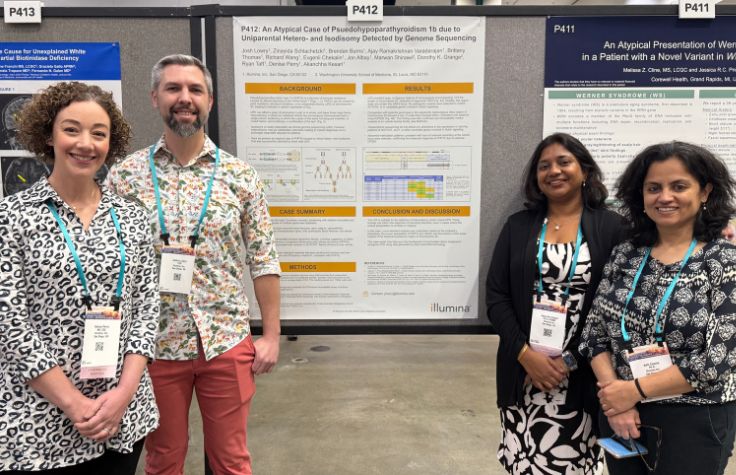
ACMG 2025において、イルミナが、全ゲノムシーケンスと改良されたバイオインフォマティクスによって、希少な遺伝性疾患の症例をどのように解決したかを示しています。
関連性から因果関係へのジャーニーを強化
複雑な疾患は遺伝的要因と環境的要因の組み合わせによって引き起こされ、その多くは完全には理解されていません。複雑な疾患の一部は高い遺伝性を持ちますが、多くの場合、特定の明確な遺伝モデルに従わず、また単一の変異遺伝子に起因しないことも多いです。実際、疾患に関連するバリアントの90%超はゲノムのノンコーディング領域に位置しています。1 複雑な疾患の約5%が単一遺伝子によって引き起こされますが、その大部分は多遺伝性です。2 自己免疫疾患、リウマチ性疾患、アテローム性動脈硬化症、多様な心疾患、神経障害、精神障害はいずれもこのカテゴリーに属する種類の疾患です。
こうした疾患の多因子的性質を考えると、複雑な疾患の研究は困難であることが分かってきました。幸いにも、アレイおよび次世代シーケンサー(NGS)などのゲノムテクノロジーによって研究が加速化しています。その結果、疾患の原因、さらに願わくば将来的には疾患の診断、治療、および予防方法をより深く理解するための道が開けています。
ポリジェニックリスクスコアは、疾患の形質に対するリスクアリルの合計に基づいて集団と比較した場合に、疾患に対する個人の遺伝的リスクを概算するものです。
ポリジェニックリスクスコアは以下のような可能性を秘めています。

発現差解析は、異なる条件の下で、または特定刺激に対する応答における遺伝子発現の変化を測定する手法です。
RNA-Seqによる発現解析により以下が可能になります:
定量的形質遺伝子座(QTL)解析は、特定の形質または動的な結果における定量的変化と相関関係を持つ分子マーカーを特定します。
QTL解析により以下が可能になります:
エピジェネティック解析では、ノンコーディングバリエーションと環境によって生じる遺伝子活性を変化させる生物学的メカニズムを解明します
エピゲノム解析により以下が可能になります:

ACMG 2025において、イルミナが、全ゲノムシーケンスと改良されたバイオインフォマティクスによって、希少な遺伝性疾患の症例をどのように解決したかを示しています。

あるコンピューターサイエンティストが、すべての人がバイオインフォマティクスツールを利用できるようにすることで、生物学の世界を変革しています。
ESHG 2025におけるゲノムイノベーションの推進
イタリア・ミラノ開催のESHG 2025において、イルミナがコンステレーションマップリード技術、空間的応用、シングルセルCRISPRを用いて、ゲノミクスをどのように前進させているかをご覧ください。
複雑な疾患ゲノムに関するニュースレター、事例研究、最新情報をお届けします。ぜひご登録ください。
ご提供いただいた個人情報は、お客様へのサポート、サービス、および販売活動の目的にのみ使用させていただきます。